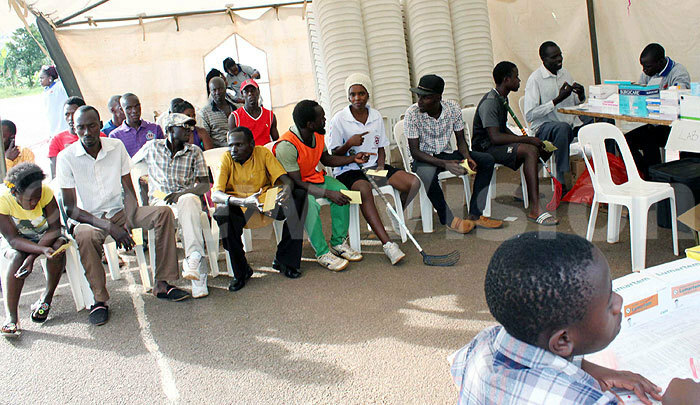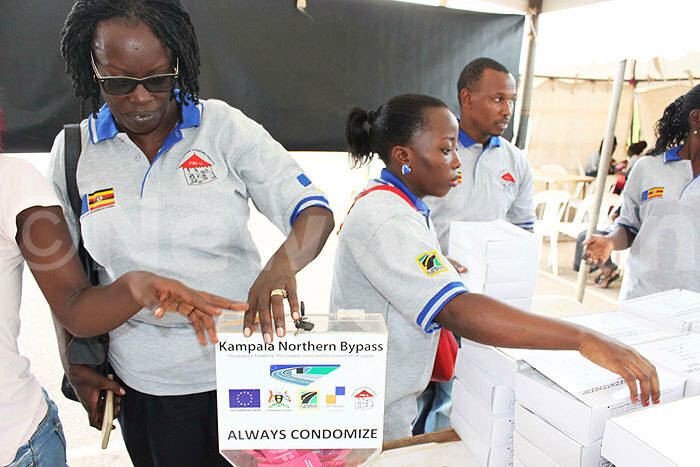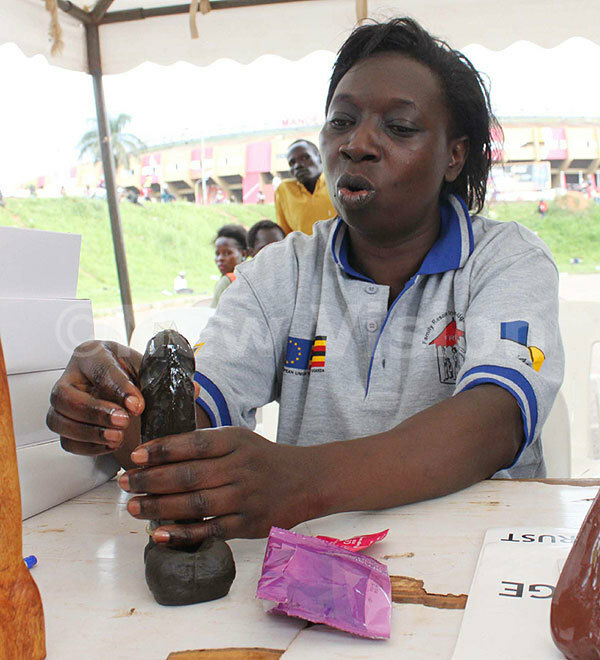The HIV testing program that is saving lives
Testing is the entry point to any medical intervention for a person who has the HIV virus.
PIC: Health workers from Kiswa Health Centre conducting HIV counselling and testing at Namboole. (Credit: Elvis Basudde)
HIV. Test. These two words, when put together, instill fear in many people's minds.
Take for instance James Mugerwa. Before, you could discuss with him anything else but having an HIV test. He had never thought of testing, fearing to be tormented by the possible news that he has the virus.
An estate dealer in Byeyogerere, a suburb in Kampala, Mugerwa still believed that an HIV-positive diagnosis is synonymous with a suspended death sentence. And there was understandable reason behind his skepticism to do the dreaded test. He confesses he had been a bit reckless with his life, sleeping with multiple women including prostitutes.
But today he knows his HIV status. He was actually stunned to learn he was HIV-negative after finally gathering the courage to go for a test.
"Really? I am free from the HIV virus? It is truly a miracle! " he exclaimed, as he wiped tears of joy, when the counselor told him his results.
After knowing his sero status, the excited and very relieved Mugerwa vowed to stick to one partner in order to maintain his status. He had never been so happy in his life, and his HIV-free status was the greatest news he had ever received.
He was among over three hundred people - mainly the youths - who turned up at Namboole ground on Sunday to benefit from an HIV outreach testing conducted by Family Rescue Initiatives-Uganda (FRI-U), an NGO designed to restore hope and dignity to families, communities and institutions affected by HIV/AIDS.

‘Not helpful at all'
FRI-U executive director Jane Mwirumubi says HIV treatment is a unique tool in the AIDS response, preventing illness and death, averting new infections and saving money.
The first thing with HIV is to know your HIV status and the only way you can know is by testing. Testing is the entry point to any medical intervention for a person who has the HIV virus.
"Finding out that you have HIV is scaring and tormenting. When you test positive, the fear and disgust, the black paranoia, the everlasting, agonizing uncertainty of the dreaded virus colours everything. But for you to remain there with an HIV status which is unknown is not helpful at all," says Mwirumbi.
She says the longer you take without knowing your HIV status the worse it gets because the HIV will continue to weaken you - if you have the virus. It is important that you know your HIV status early, because knowing your status early enables health workers to start managing you to stabilize very quickly, or seek early treatment.
"It is a government directive that for every road in Uganda under construction, or even those being upgraded, there must be a social program which caters for HIV/AIDS, occupational health and safety, gender sexual reproductive health for the workers and the host communities."

Jane Mwirumubi, executive director of FRI-U, with her team at the camp. (Credit: Elvis Basudde)
There is a belief that road construction involves immigrants who are a key population in HIV prevention.
FRI-U works in partnership with the ministry of health and their program is strictly on the Kampala Northern Bypass catering for the road workers and the host communities around the road to provide them with HIV/AIDS sensitization and testing.
They have a clinic in the camp at Namanve with a nurse and a counselor all the time where those who want to do HIV testing can go to. They also do First Aid and other minor ailments. They have another camp in Gayaza where they carry out routine HIV testing.
Mwirumubi says they also do condom demonstration and sensitization, counseling and give out The Support on AIDS and Life through Telephone Helpline (SALT) number for confidential counseling.
She says they often conduct such outreaches around roundabouts and the turnout is always good, with always over three hundred people, 90% of them being repeat tests. The project started in June last year and it has had a very good impact.

A staff of FRI-U demonstrates how a male condom is used. (Credit: Elvis Basudde)
Once in a while they carry out moonlight HIV clinics with the aim to drive down the HIV rate among some of the country's most at-risk groups, like the long distance truck drivers and commercial sex workers.
They have done moonlight clinics in Kimombaasa in Bwayise and the turnout was "awesome".
Family Rescue Initiatives was sub-contracted by MOTA-ENGIL ENGENHARIA (The contractor of KNBP) to implement HIV & AIDS, STI's, Gender, Occupational Safety and Health as well as Sexual Reproductive Health (SRH) activities along Kampala Northern Bypass throughout the construction period.
The target populations are the road construction workers and the project host communities along the Kampala Northern Bypass.